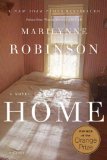Summary | Excerpt | Reading Guide | Reviews | Beyond the Book | Readalikes | Genres & Themes | Author Bio

Critics' Opinion:
Readers' Opinion:
First Published:
Sep 2008, 336 pages
Paperback:
Sep 2009, 336 pages
 Book Reviewed by:
Book Reviewed by:
Amy Reading
Buy This Book
The town seemed different to her, now that she had returned there to live. She was thoroughly used to Gilead as the subject and scene of nostalgic memory. How all the brothers and sisters except
Jack had loved to come home, and how ready they always were to leave again. How dear the old place and the old stories were to them, and how far abroad they had scattered. The past was a very fine thing, in its place. But her returning now, to stay, as her father said, had turned memory portentous. To have it overrun its bounds this way and become present and possibly future, too - they all knew this was a thing to be regretted. She rankled at the thought of their commiseration.
Most families had long since torn down their outbuildings and sold off their pastures. Smaller houses in later styles had sprung up between them in sufficient numbers to make the old houses look increasingly out of place. The houses of Gilead had once stood on small farmsteads with garden patches and berry patches and henhouses, with woodsheds, rabbit hutches, and barns for the cow or two, the horse or two. These were simply the things life required. It was the automobile that changed that, her father said. People didn’t have to provide for themselves the way they once did. It was a loss—there was nothing like chicken droppings to make flowers thrive.
Boughtons, who kept everything, had kept their land, their empty barn, their useless woodshed, their unpruned orchard and horseless pasture. There on the immutable terrain of their childhood her brothers and sisters could and did remember those years in great detail, their own memories, but more often the pooled memory they saw no special need to portion out among them. They looked at photographs and went over the old times and laughed, and their father was well pleased.
Boughton property lay behind the house in a broad strip that spanned two blocks, now that the town had grown and spread enough to have blocks. For years a neighbor—they still called him Mr. Trotsky because Luke, home from college, had called him that—planted alfalfa on half of it, and her father sometimes tried to find words for his irritation about this. "If he would just ask me," he said. She was too young at the time to understand the alfalfa putsch, and she was in college when she began to see what R the old stories meant, that they were really the stirring and smoldering of old fires that had burned furiously elsewhere. It pleased her to think that Gilead was part of the world she read about, and she wished she had known Mr. Trotsky and his wife, but old as they were, they had abandoned Gilead to its folly in a fit of indignation about which no one knew the particulars, just at the end of her sophomore year.
The land that was the battlefield would have been unused if the neighbor had not farmed it, and alfalfa was good for the soil, and the joke and perhaps the fact was that the neighbor, who seemed otherwise unemployed and who railed against the cash nexus, donated his crop to a rural cousin, who in exchange donated to him a certain amount of money. In any case, her father could never finally persuade himself that objection was called for. The neighbor was also an agnostic and probably spoiling for an ethical argument. Her father seemed to feel he could not risk losing another one of those, after the embarrassing episode when he tried to prevent the town from putting a road through his land, on no better grounds than that his father would have opposed it, and his grandfather. He had realized this during a long night when his belief in the rightness of his position dissipated like mist, under no real scrutiny. There was simply the moment, a little after 10:00 p.m., when the realization came, and then the seven hours until dawn. His case looked no better by daylight, so he wrote a letter to the mayor, simple and dignified, making no allusion to the phrase "grasping hypocrite," which he had thought he heard the mayor mutter after him as he walked away from a conversation he had considered pleasant enough. He told all of them about this at the dinner table and used it more than once as a sermon illustration, since he did devoutly believe that when the Lord gave him moral instruction it was not for his use only.
Excerpted from Home by Marilynne Robinson. Copyright © 2008 by Marilynne Robinson. Published in September 2008 by Farrar, Straus and Giroux, LLC. All rights reserved. This work is protected under copyright laws and reproduction is strictly prohibited. Permission to reproduce the material in any manner or medium must be secured from the Publisher.





The Flower Sisters
by Michelle Collins Anderson
From the new Fannie Flagg of the Ozarks, a richly-woven story of family, forgiveness, and reinvention.

The House on Biscayne Bay
by Chanel Cleeton
As death stalks a gothic mansion in Miami, the lives of two women intertwine as the past and present collide.

The Funeral Cryer by Wenyan Lu
Debut novelist Wenyan Lu brings us this witty yet profound story about one woman's midlife reawakening in contemporary rural China.
Your guide toexceptional books
BookBrowse seeks out and recommends the best in contemporary fiction and nonfiction—books that not only engage and entertain but also deepen our understanding of ourselves and the world around us.